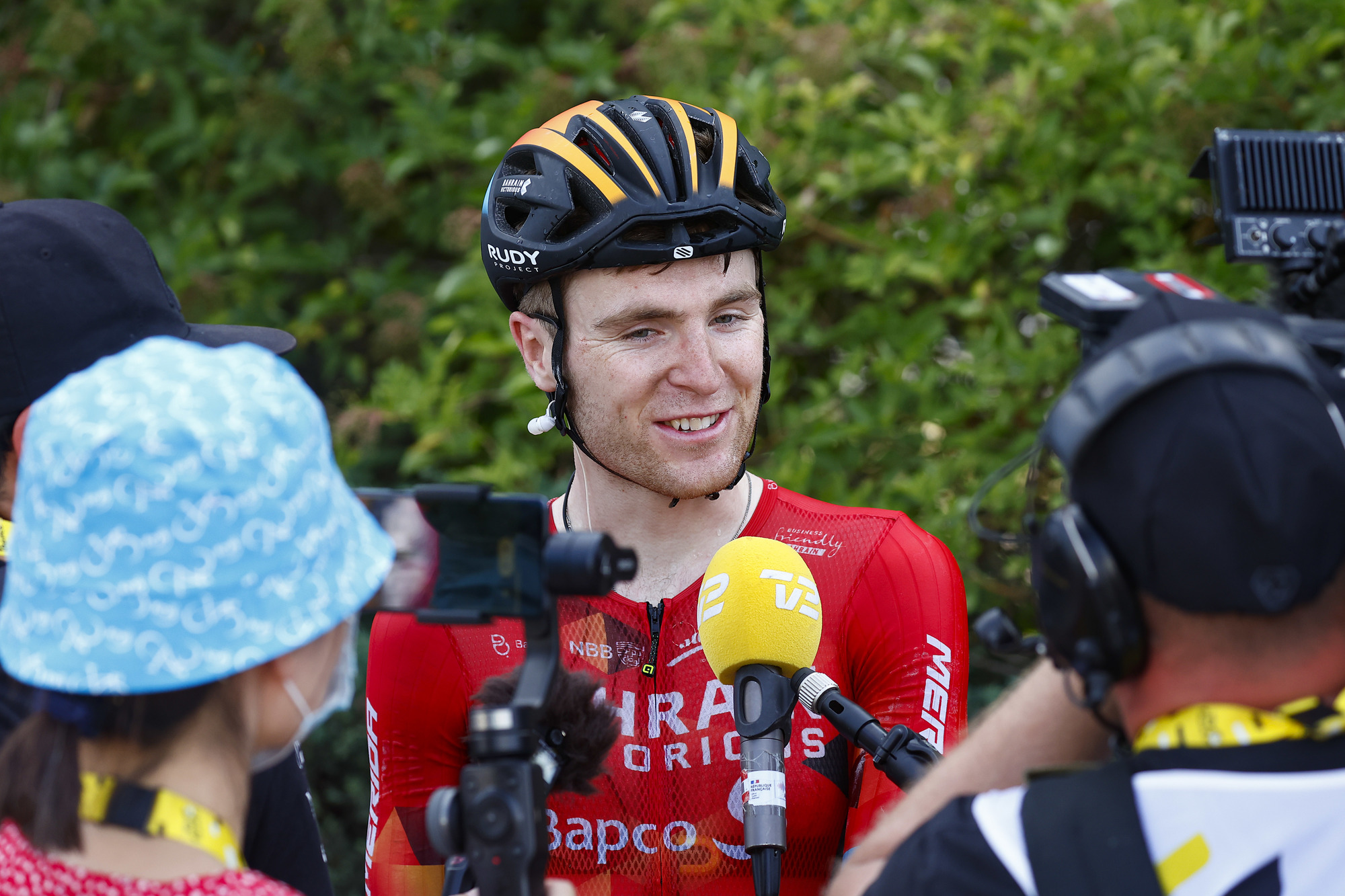Fred Wright goes long again and gets closer at the Tour de France
Briton takes second in Saint-Étienne behind Mads Pedersen

When Fred Wright swung onto the finishing straight on Saint-Étienne’s Rue Claude Verney-Carron, he might already have suspected that the chance to claim the biggest victory of his career had already passed him by, but hope is always a durable commodity among escape artists.
The three-up sprint in the shadow of the Stade Geoffroy Guichard delivered the anticipated verdict, however. Mads Pedersen (Trek-Segafredo), the break’s strongman, won stage 13 of the Tour de France, while Wright had to settle for second ahead of Hugo Houle (Israel Premier Tech).
The Tour can break your heart, but Wright wore his disappointment lightly. His first thought on crossing the finish line was to freewheel in Pedersen’s direction, politely nudging his way through the Trek-Segafredo entourage to offer his congratulations to the day’s winner.
A little further along the street, Wright stopped against the barriers and talked a scrum of reporters through his brush with immortality. The previous day, his friend and contemporary Tom Pidcock (Ineos) won atop Alpe d’Huez and another Briton, Max Sciandri, won from a break in this city when the Tour left the Alps in 1995. The portents were promising, but Pedersen’s strength in the finale brooked no argument. Nothing to be done.
“It would've been pretty special to have two of us boys win two stages in a row,” said Wright, who tracked Pedersen’s decisive move with 12.5km remaining. “I mean, I knew that to beat Mads, I needed to go on that last little kicker. But I’ll be honest, I just didn’t have the legs.”
After the rigours of the previous two days in the Alps, few riders in the entire peloton had the legs to endure a day off the front as Wright did here. 50km into the stage, he succeeded in bridging across to the break of the day, and a glance at the dossards in the pace line confirmed he was in elite company. He was sure from the start the move could go the distance.
As well as Pedersen and Houle, Wright swapped turns with world time trial champion Filippo Ganna (Ineos), Stefan Küng (Groupama-FDJ), Quinn Simmons (Trek-Segafredo) and Matteo Jorgenson (Movistar). The rolling terrain didn’t preclude a bunch sprint, with Alpecin-Deceuninck and – at least until Caleb Ewan’s crash – Lotto Soudal giving chase, but the spoils would fall to the group of strongmen out in front.
The latest race content, interviews, features, reviews and expert buying guides, direct to your inbox!
“I was happy to make it, to be honest. I’d been saying before the stage I wanted to get into the break, but that was a hard one to get into,” said Wright, who was already up the road to Lausanne last weekend and again en route to Megève on Tuesday.
Wright has been a rare bright spot in a troubled Tour for Bahrain Victorious. The team began the race in the eye of a storm after their hotel was searched by police in Copenhagen on the eve of the Grand Départ as part of a Europol-coordinated investigation into the alleged “use of prohibited substances.” Earlier in the week, police searches had been out in the homes of riders and staff in Belgium, Spain, Croatia, Italy, Poland and Slovenia.
While established riders like Matej Mohoric and Damiano Caruso have been strangely subdued thus far, the 23-year-old Wright has been an enthusiastic presence in his second Tour appearance. Already among the aggressors at the Tour of Flanders, where he finished 7th, Wright has continued along the same lines in the white heat of July. Indeed, the soaring temperatures that have marked the second week continued on the trek across the Rhône on Friday. Wright joked that being off the front was the most effective way to combat the heat.
“It’s better in the break because you get ice all the time and you can put water over the head,” Wright said. “So for a British kid, that’s not too bad.”
For most the stage, Wright and his companions were allies of circumstance as they combined to fend off the chasers, but friends quickly morphed into foes once it became clear that theirs was an unassailable lead. Pedersen, the fastest finisher of the move by reputation, decided to get his retaliation in first by attacking with 12.5km to go. Wright had strength enough to follow but not to come past. Pedersen, meanwhile, had the sharpness to ensure there would no late surprises.
“He surprised me when he attacked to be honest, I thought it would have been Jorgenson or Küng. But he was stronger than me, I think,” said Wright. “I was believing the whole time that we could make it, but in the end, I just didn’t have the legs. When Mads went for it on the climb, that surprised me, and I couldn’t make the move over the top of him that I needed to. I’m pretty disappointed with it, to be honest, but I tried.”

Barry Ryan was Head of Features at Cyclingnews. He has covered professional cycling since 2010, reporting from the Tour de France, Giro d’Italia and events from Argentina to Japan. His writing has appeared in The Independent, Procycling and Cycling Plus. He is the author of The Ascent: Sean Kelly, Stephen Roche and the Rise of Irish Cycling’s Golden Generation, published by Gill Books.